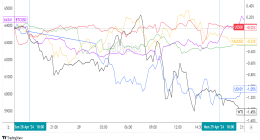
The Chancellor’s announcement that a new British Isa will be rolled out to investors has thrown up many questions.
Many will be wondering which investments will qualify, when it will arrive, and who it will benefit.
It has also been met with criticism from financial experts, with one expert branding it a ‘politically-motivated stunt ahead of upcoming elections, rather than a well-considered strategy aimed at sustainable economic growth’.
Here is everything we know about the British Isa so far.

Buy British: The Chancellor announced a new British Isa at the Budget, but there are many questions surrounding it
What is the British Isa?
The British Isa is a new type of Isa which will allow savers to invest an additional £5,000 a year tax-free in UK assets.
Britons can currently save or invest £20,000 in cash, stocks or shares in each tax year through an Isa without paying tax on the gains.
The British Isa would allow people to invest a further £5,000 on top of the existing allowance, but only into UK assets.
When could it arrive?
A consultation on how to design and deliver the British Isa has now started and will run until 6 June.
The Government is inviting responses to the consultation until that point, so savers won’t see any action on the British Isa until after that point.
When the consultation ends, the Government will then need to review responses and set out the final rules. At the earliest, we might know what these rules look like later in 2024. Providers would then need time to build a new product.
April 2025 is likely to be the earliest possible date it would be available to customers, according to investment platform AJ Bell.
Which investments might qualify?
The Chancellor’s announcement instantly triggered questions over what counts as a British company.
The announcement was swiftly followed by a consultation document that sets out various ways in which investments qualifying for the UK Isa could be defined.
‘At the moment it looks like any UK listed shares will qualify, such as those that trade on the London Stock Exchange, as well as shares listed on the AIM market for smaller companies,’ said an AJ Bell spokesman.
The consultation sets out that ordinary shares, collective investment vehicles, corporate bonds, gilts and cash could potentially be included.
As a starting point the Government suggested it could replicate some of the previous approaches to Personal Equity Plans (PEPs) for the British Isa.
PEPs were a tax-free wrapper to hold investments, discontinued in 1999, and replaced with Isas.
One such proposal is to include all ordinary shares in companies that are incorporated in the UK and are listed on a UK-recognised stock exchange.
The investment trust question
When it comes to collective investment vehicles, such as investment trusts, the Government is considering whether to limit inclusion in the British Isa to those that invest at least 75 per cent of assets in the UK, as the old PEP rules allowed.
This would prevent all listed closed-end funds being eligible for the British Isa, however.
Another proposal is that all UK-listed companies would be eligible for inclusion (including those listed on the Main Market of the London Stock Exchange, AIM, Aquis and Cboe Europe).
Nick Britton, research and content director at the Association of Investment Companies (AIC), said: This would be a simple, clear approach that would help support UK capital markets as well as offer investors access to diversified portfolios (investment companies) alongside trading company shares.
‘Investment companies make up more than a third of the FTSE 250 and are simply too large a part of the UK market to be ignored.’
The AIC’s chief executive, Richard stone added: ‘All UK-listed shares, including investment companies, should be eligible for the UK Isa.’
Is it in the same account or a separate Isa?
As set out in the consultation, the British Isa will be a new Isa with its own £5,000 annual allowance in addition to the existing £20,000 annual Isa allowance.
A spokesperson from stockbroker AJ Bell said: ‘This will be separate to existing Isas. At the moment everyone has a £20,000 Isa allowance, which you can use across the various Isa products available, including stocks and shares Isas, cash Isas and Lifetime Isas.’
The UK Isa would be a new addition, with an extra £5,000, taking the total Isa allowance to £25,000 per year.
The British Isa could allow subscriptions to a number of different UK Isas in the same tax year, keeping it in line with other Isas and could provide investors with more choice.
As the UK Isa annual allowance is lower than the general Isa annual allowance, it could be simpler for investors if they are only allowed to subscribe to one UK Isa in a tax year, the consultation said.
How many people could benefit?
One of the arguments against the British Isa is that not nearly enough people use up their £20,000 Isa limit to begin with. As a result, this change will only benefit those who who already max out their Isa limit, and those who want to focus on domestic investments.
According to investment platform AJ Bell, around 800,000 people use up their maximum annual Isa allowance investing in stocks and shares Isas in any given year.
With this in mind, it seems the new British Isa will only appeal to those who currently max out their Isa limits, providing scope for an extra £5,000 tax-free saving.
It will also benefit those with cash savings outside of an Isa, many of whom will now be paying tax on the interest.
Michael Summersgill, chief executive of AJ Bell said: ‘A tiny minority of people max out their £20,000 Isa allowance each year, but these are the only ones that will see any benefit from the additional British Isa allowance.
‘In the context of the £2trillion plus UK stock market, any additional investment generated by these investors through the British Isa will be a rounding error.’
How would it boost the UK stock market?
The consultation on a new British Isa comes alongside other measures to boost UK financial markets and the wider economy.
It follows on from previous pension fund reforms that will see some providers increase investment in early-stage UK companies.
‘Isas represent a significant pool of savings and the Chancellor is hoping he can encourage people to buy British,’ said Mike Ambery, retirement savings director at Standard Life.
Mike O’Shea, chief executive of Premier Miton Global Investors said: ‘Ensuring companies have access to the capital they need will encourage them to scale up and list here in the UK.
‘The British Isa is a crucial step in starting to recapitalise British businesses, and make the UK listing regime the global capital of capital.’
In theory, the British Isa could provide a shot in the arm for UK equities if a large number of investors start pouring extra money into UK stocks, pushing up prices.
But some financial experts believe the British Isa is doomed to fail in its objective of boosting the UK stock market.
Of the money customers currently invest in their stocks and shares Isas, AJ Bell says 50 per cent goes into UK assets.
Michael Summersgill said: ‘If the aim is to boost investment in UK companies, the answer lies elsewhere.
‘For example, extending the existing AIM exemption from stamp duty and/or inheritance tax to a wider pool of UK assets would actually have a meaningful impact.’










